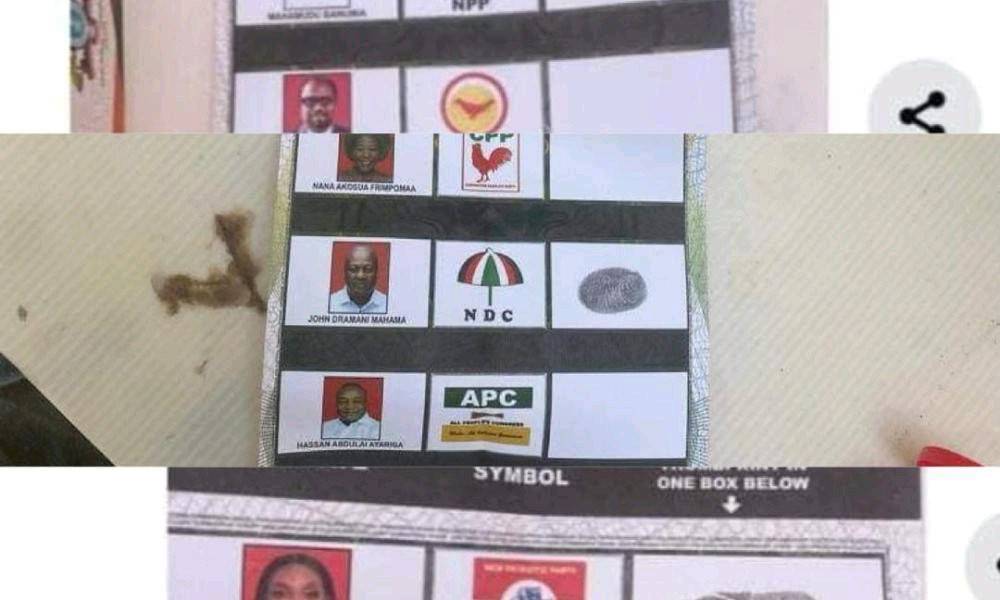In Ghana, there are strict laws that protect the secrecy of voting, ensuring that no one knows who you vote for. These laws help maintain the fairness and privacy of the election process. However, recently, there have been several incidents where some voters, including security personnel and members of the media, have shared pictures of their ballots on social media. This has caused a stir and raised concerns about how the secrecy of elections is being compromised.
Ghana’s Constitution clearly states that voting during elections must be done in secret. According to Article 49 (1) of the Constitution, “voting shall be by secret ballot†during any public election or referendum. This means that when citizens cast their votes, they should do so privately, and no one should be able to know who they voted for. The idea behind this is to prevent any form of pressure or influence on voters. Everyone should be free to vote based on their own choice without fear of judgment or punishment.
But despite these laws, some voters in Ghana have decided to take pictures of their ballots and post them online. These pictures have spread quickly on social media, and some have even gone viral. This has sparked a debate about whether sharing these ballot pictures is a harmless act or a serious violation of election laws.
One of the main concerns with posting ballot pictures online is that it can lead to voter intimidation or influence. When people know how others are voting, they might try to pressure them into changing their choice. For example, a person might feel uncomfortable voting differently if they see their friends or colleagues supporting a different candidate. This can also happen in workplaces or even among family members, where a person might feel pushed to vote a certain way to fit in or avoid conflict.
Moreover, sharing ballot pictures can create a sense of distrust in the election process. If voters start seeing pictures of ballots online, they might question whether their vote truly remains secret. They might wonder if others are being influenced or pressured into voting a certain way because of these online posts. This could damage the overall credibility of the elections, as people may begin to feel that the process is not secure or fair.
The act of sharing ballots can also undermine the privacy of voters. Voting is one of the most personal and private rights a citizen has. By sharing pictures of ballots, voters are essentially exposing their private choices to the public, which goes against the very principle of secret voting. It could make people reluctant to vote in the future if they feel that their personal preferences will no longer be kept confidential.
Interestingly, some of the pictures that have been shared online are of well-known political figures in Ghana, such as John Dramani Mahama, Dr. Mahamudu Bawumia, and Darkoa Newman, the Member of Parliament for Okaikwei South. These public figures have been part of the national conversation during elections, and seeing their ballots online only adds to the controversy. It shows that not even public figures are immune from breaking this important rule.
Some security personnel, who are supposed to protect the election process, have also been caught sharing their ballots on social media. This is particularly troubling because security personnel play a key role in maintaining order and ensuring that elections are fair. If they break the rules, it sends a message that even those in positions of authority do not respect the laws in place to protect the election process.
The media, too, has been involved in sharing pictures of ballots. Journalists and media personnel have a responsibility to report news in an unbiased and fair manner. By sharing pictures of ballots, they risk showing favoritism toward certain candidates and influencing the opinions of their audience. This could lead to a loss of trust in the media’s ability to provide objective and balanced coverage of elections.
In response to these incidents, the Electoral Commission of Ghana and other authorities have expressed concern about the violation of the secrecy of the ballot. They have reminded citizens about the importance of keeping their vote private and warned that sharing pictures of ballots could lead to legal consequences. The authorities are urging voters to respect the laws of the land and to refrain from actions that could undermine the integrity of the election process.
There is also a call for more public education on the importance of secret voting. Many people might not fully understand why the secrecy of the ballot is so crucial. Educating the public about how the secrecy of voting protects democracy and ensures fair elections could help prevent future violations. It is important for every voter to know that their choice should be kept private and that they should not share their ballots with anyone, especially on social media.
In conclusion, while the act of posting ballot pictures online might seem like a harmless way to express political views, it has serious consequences for the integrity of the election process. The laws protecting the secrecy of voting are in place to ensure that elections are free, fair, and democratic. When these laws are ignored, it can lead to voter pressure, loss of privacy, and a lack of trust in the election process. It is important for all Ghanaians, from the general public to security personnel and the media, to respect the laws and preserve the secrecy of the ballot for the good of the country and its democracy.




No comments yet
Be the first to share your thoughts!